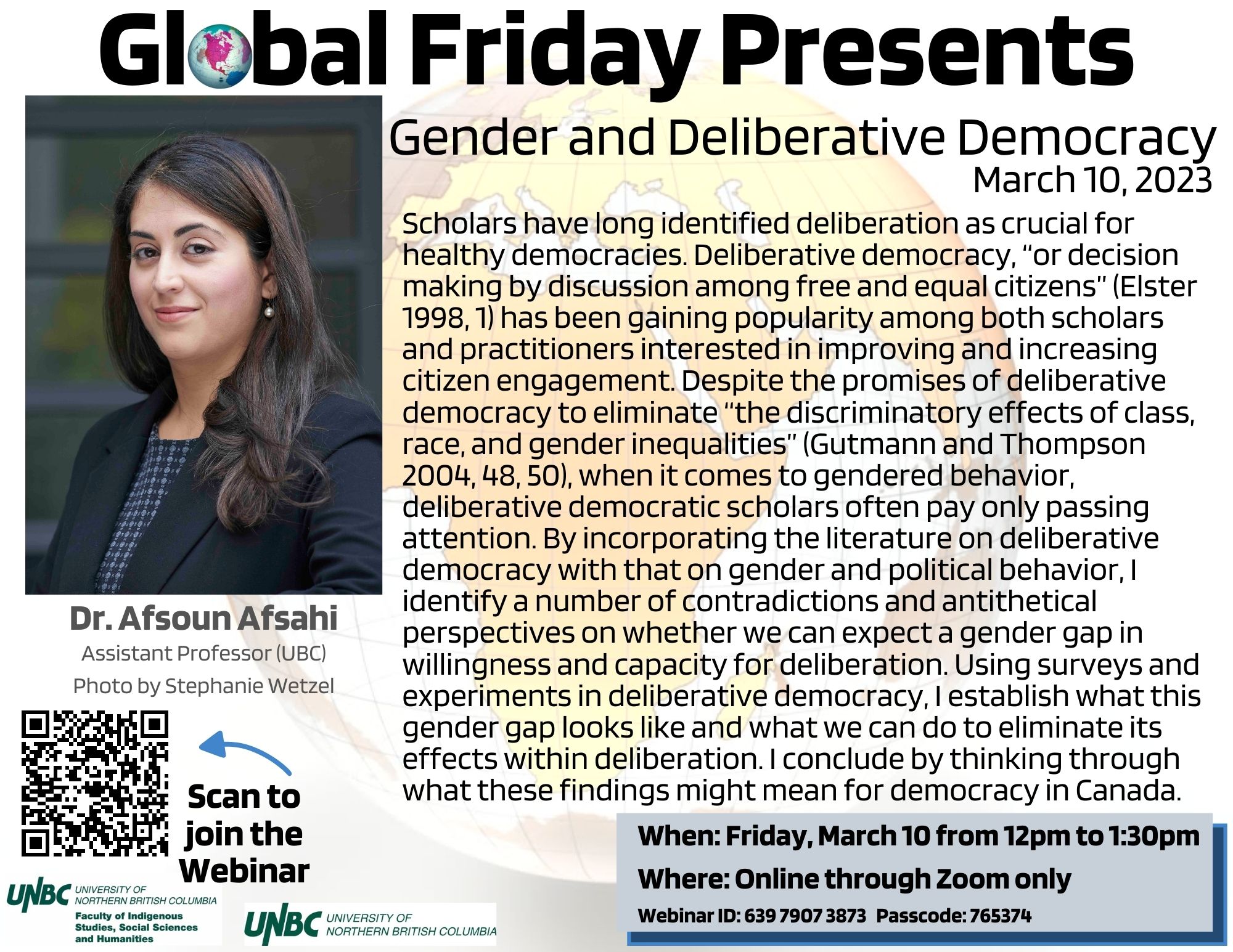Gender and Deliberative Democracy

Friday, March 10, 2023 - 12:00pm to 1:30pm
Location:
Zoom Only
Campus:
Online
Global Friday Presents
Dr. Afsoun Afsahi
Assistant Professor, Political Science
UBC
Dr. Afsoun Afsahi
Assistant Professor, Political Science
UBC
Abstract: Scholars have long identified deliberation as crucial for healthy democracies. Deliberative democracy, “or decision making by discussion among free and equal citizens” (Elster 1998, 1) has been gaining popularity among both scholars and practitioners interested in improving and increasing citizen engagement. Despite the promises of deliberative democracy to eliminate “the discriminatory effects of class, race, and gender inequalities” (Gutmann and Thompson 2004, 48, 50), when it comes to gendered behavior, deliberative democratic scholars often pay only passing attention. By incorporating the literature on deliberative democracy with that on gender and political behavior, I identify a number of contradictions and antithetical perspectives on whether we can expect a gender gap in willingness and capacity for deliberation. Using surveys and experiments in deliberative democracy, I establish what this gender gap looks like and what we can do to eliminate its effects within deliberation. I conclude by thinking through what these findings might mean for democracy in Canada.
Speaker's Bio: Dr. Afsoun Afsahi is an Assistant Professor of Political Theory at the University of British Columbia. From September 2018 to June 2021, she was an Assistant Professor of Political Theory and Gender at the University of Amsterdam (Tenured in December 2020). Prior to this, she held a Justitia Amplificata Postdoctoral Fellowship at Goethe Universität Frankfurt and Freie Universität Berlin. Born and raised in Iran, she has lived in five different countries.
Dr. Afsahi's research agenda explores the challenges, opportunities, and best methods of inclusion and representation of marginalized communities in democratic decision-making processes. In their book project, they examine whether people are willing and capable of engaging in deliberations with those with whom they disagree on issues that touch upon their cultural and religious identities. In particular, they devised and, through experiments, tested the efficacy of two facilitation methods in increasing the capacity of participants to participate in a respectful, reflective, and constructive way. While they found some evidence of unwillingness for participation in deliberations that can challenge the cultural and religious identities of participants, the facilitative methods were both highly successful at increasing discourse quality by limiting the instances of engagement in undesired behaviours. Currently, Dr. Afsahi is expanding this research to consider the likelihood and longevity of opinion change as a result of deliberation when different facilitative methods are used.
Dr. Afsahi's research agenda explores the challenges, opportunities, and best methods of inclusion and representation of marginalized communities in democratic decision-making processes. In their book project, they examine whether people are willing and capable of engaging in deliberations with those with whom they disagree on issues that touch upon their cultural and religious identities. In particular, they devised and, through experiments, tested the efficacy of two facilitation methods in increasing the capacity of participants to participate in a respectful, reflective, and constructive way. While they found some evidence of unwillingness for participation in deliberations that can challenge the cultural and religious identities of participants, the facilitative methods were both highly successful at increasing discourse quality by limiting the instances of engagement in undesired behaviours. Currently, Dr. Afsahi is expanding this research to consider the likelihood and longevity of opinion change as a result of deliberation when different facilitative methods are used.
Global Fridays gratefully acknowledges funding from the Faculties of Indigenous Studies, Social Sciences and Humanities; Business and Economics; Environment; Human and Health Sciences; Science and Engineering.
